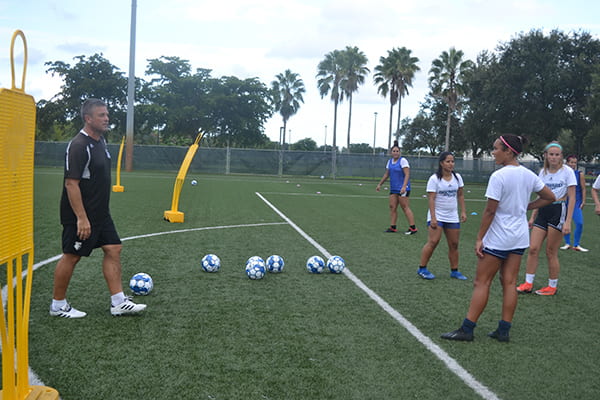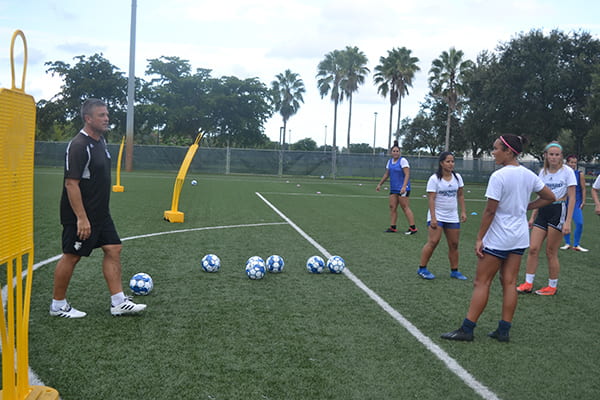Bella Riccitelli
Sports Editor
Broward College has been the home to many student athletes for almost 60 years.
Over the years, the fields, courts and walls of BC’s Athletic Department have welcomed, helped and sent off many students.
Since 1962, the Athletic Department has been there in more ways than one for hundreds of student athletes.
With teams for baseball, basketball, soccer, softball, tennis and volleyball, many student athletes experience college at a different pace and point of view than other students.
The Athletic Department, located in Davie at Central Campus, is where students begin their journey as athletes.
Filled with staff who keep student athletes in mind, those who work in the Athletic Department want only the best for the students.
For many looking in from the outside, living as a student athlete means going to school and then going to practice or a scheduled game.
According to the National Collegiate Athletic Association, over 450,000 college students participate in a sports team each year.
However, there is much more than meets the eye when it comes to being a student athlete.
Being a student athlete means having what seems like an endless supply of support, benefits and more.
Many, if not all, coaches to college players are everything those students need, all in one.
When accepting the job title as a head or assistant coach, those individuals are taking on a role that can leave a mark for a lifetime on those guided by them in the athletics world.
Any coach of high standard would agree – being a coach means also working as a mentor, recruiter, friend and supporter – all in one.
“I believe one of the most critical parts of having a successful program is the relationship between the coach and the players,” said Olaf Henke, women’s soccer Head Coach.
“We do individual meetings on a regular base. It helps to get to know each other a lot better than just in team settings. I think it also offers players an opportunity to talk about things that might be outside the game.”
BC, like most colleges and universities, ensure that academics come before athletics.
In order to participate on a sports team at BC, students are required to have a minimum grade point average of 2.0.
Additionally, some of the coaches at BC require study groups within the team on a weekly basis.
“The academics are part of the regular individual meetings. We request our players to submit progress reports on a regular base to us, signed by their professors,” said Henke.

Without good academic standings, students would not be able to live out their dreams as athletes, and the coaches make sure they do not forget this.
“Academics are why they’re here, so academics come first,” said Gregg Bennis, baseball Head Coach.
Student athletes go from strangers to teammates rather quickly, considering all of the time they spend together in a group setting.
Easily, lifelong bonds can bloom and last.
“In the modern day world where technology is ever growing and more and more dictates our lives, friendships, camaraderie, setting and pursuing a common goal, learning together from success and failure are invaluable factors in the growth of young people,” said Henke.
While emerged in a personal, tight-knit circle of a team, men and women alike have one definite similarity: developing mentally, physically and emotionally.
“The best part about being a student athlete is developing in a few areas at the same time – getting a degree and playing soccer – so I have two options,” said Men’s Soccer player Michal Gorszezaryk.
“I will go play pro or I can get good work after university.”
Non-tangible experiences are sometimes valued at a higher level than those otherwise.
For example, living as a student athlete can bring a number of experiences that reap of benefits forever.
[Some of these include] “Realizing their aspirations, confronting their vulnerabilities, and managing their greatest anxieties while blossoming…,” said Marlena Hall, women’s tennis Head Coach.
At the end of the day, none of this would be possible for students if it was not for the athletic department, located on the school’s main campus.
Students and even faculty and staff can utilize the department as a supportive outlet.
Considering the fact that BC is a junior college, the funds provided are not much when compared to bigger universities. However, that does not stop BC from excelling.
“The Athletics Department does a lot with less,” said Bennis.
The wholeheartedness that is found within the coaches shines through and is apparent when it comes down to it.
Michael Goodrich, BC’s Athletics Director, has over 15 years of experience in the school sports world.
Goodrich’s desire for the well-being of students along with his expertise in sports are just some of the contributions he makes to BC’s Athletic Department.
“Clearly we look for people that have extensive knowledge of their sport. However, it is more important that they [coaches] are adept at communication of this same knowledge to the student-athletes,” said Goodrich.
“The best coaches are educators first.”
If students are interested in joining a sport at BC, more information can be found under the athletics tab on BC’s website.
riccbj@mail.broward.edu
